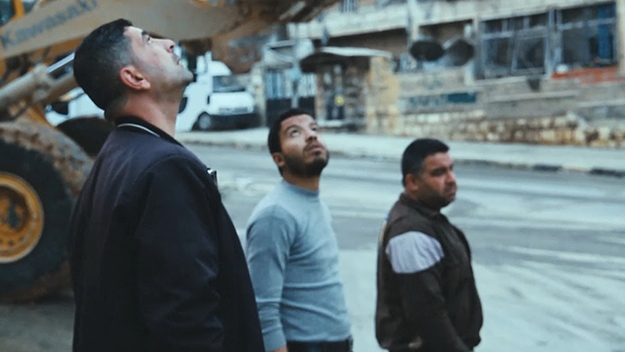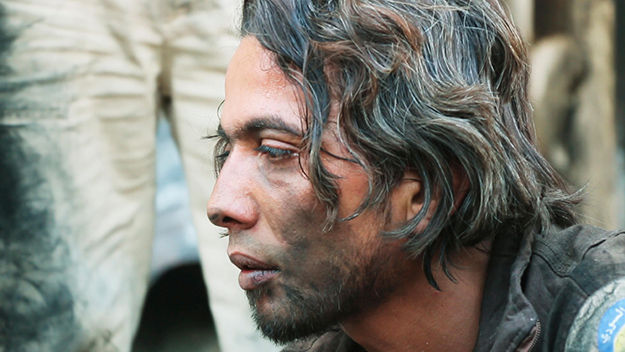Review: Last Men in Aleppo

“No poetry after Auschwitz,” the German philosopher Theodor Adorno famously declared in 1951. The crisis of conscience that struck the Western world upon the discovery of Nazi concentration camps generated a profound crisis of representation; after the inconceivable, harrowing spectacle of extermination, the next step for art was unclear. The ongoing Syrian Civil War—with its mass displacement, death, and evidence of war crimes—continues to have impact today, especially in the realm of documentary. The Sundance Grand Jury Prize winner Last Men in Aleppo sees World War II images of mass murder and destruction find their ghastly contemporary counterparts in the besieged Syrian city wrecked by missile attacks and destitution: dead babies, ripped-apart bodies, and decimated buildings suggest the end of the world as well as that of the medium. What is the next step for cinema after our laying eyes on such unspeakable horrors?
The apocalyptic imagery of Syrian director Firas Fayyad’s Last Men in Aleppo is so heightened as to evoke science fiction, but it reflects his country’s quotidian reality since 2012, when governmental repression of nationwide protests against President Assad escalated into a gruesome civil war. The film depicts Aleppo’s siege from the point of view of members of the White Helmets, the volunteer organization dedicated to rescuing civilians hit by Russian and Syrian air strikes. The repetitive, mechanical rhythm of rescue operations imbues the narrative with a nightmarish quality: as deformed and colorless bodies are dragged out of the rubble one after another, the living and the dead become indistinguishable to our eye. Fayyad employs an unobtrusive observational style that viscerally involves the audience in the frenetic rescue sequences and conveys a striking sense of intimacy during nocturnal interludes in barren interiors where the drained men exchange hopes and concerns. Such scenes, coupled with occasional recreational moments like a football match among the ruins and a visit to the playground with the children on a sunny day, brighten the otherwise bleak and claustrophobic mood. But paradise and hell have become interchangeable in Aleppo, and what begins as play quickly turns into terror when a new threat presents itself.

The question of escaping the crumbled, dismal town frequently comes up among the men: their kids are growing up in confinement and lack proper food and medical care. But that life will be easier elsewhere is simply an illusion. Leaving means enduring even more dreadful conditions in refugee camps at the Turkish border and perhaps being stranded there, or embarking on a perilous journey across the sea to reach Europe and possibly dying along the way. The sensitive and spirited Khaled—a former painter who was proclaimed “the hero of Aleppo” after rescuing a baby from the rubble—offers poetic resistance as the solution, building a colorful fishpond in his backyard in an attempt to inject some beauty into the infernal landscape.
It may be tempting to draw comparisons between Last Men in Aleppo and other documentaries addressing the same subject, like The White Helmets, but against the Orientalist sensationalism of the latter, what Last Men in Aleppo proposes is a deeply felt, poignant portrait of a paradise lost. Fayyad has devoted himself to documenting his country’s collapse since the 2011 uprisings and was even imprisoned and tortured by authorities for his work. An inherently personal endeavor, his movie is permeated with a heartrending sense of mourning over his nation’s shattered identity as well as his own. When the filmmaker dreamily glides his camera across Aleppo’s ruins, he is not merely moving in counterpoint to the chaos but rather unnervingly revealing all that has vanished, in a simultaneous annihilation by war of his country’s past and future. And in the terrible limbo that is the present, only Khaled’s goldfish continue to provide some warmth of emotion amid the horror.
Yonca Talu is a filmmaker living in Paris. She grew up in Istanbul and graduated from NYU Tisch.







